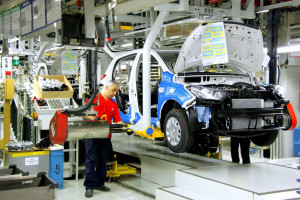 Hyundai Motor Group will invest US$80 billion in the next three years for various investments to raise the company’s global image. This is equivalent to pouring 20.2 trillion won into investment and development every year, even 1 trillion won higher than the South Korean government’s R&D budget of 18.9 trillion won as of 2015.
Hyundai Motor Group will invest US$80 billion in the next three years for various investments to raise the company’s global image. This is equivalent to pouring 20.2 trillion won into investment and development every year, even 1 trillion won higher than the South Korean government’s R&D budget of 18.9 trillion won as of 2015.
“Through the investment, we will secure core technology essential for future vehicles such as eco-friendly cars and smart cars. Also we will be able to give a boost to its manufacturing by establishing global production line,” a Hyundai Motor spokesman stated. “About 61.2 trillion won, or 76 per cent of the entire budget, will be allotted to domestic affairs, thus contributing to the local economy,” he added.
With the company’s annual car sales surpassing 8 million units worldwide, Hyundai is preparing for the next stage: enhancing its global competitiveness. Company chairman Chung Mong-koo has previously stated, “The future of Hyundai Motor Group relies on how we secure innovative technologies and nurture creative talents.”
The investments will be made into local-focused cars, future vehicles including green cars, and the so-called premium cars.
About 11.3 trillion won will be allocated to developing plug-in hybrid and electric car as well as additional fuel cell cars, alongside their core parts such as motors and batteries.
Manufacturing plants will be established in the growing markets including China and Mexico, where the production of cars tailored to the respective regions will be reinforced. An additional 2 trillion won will be set aside to refine self-driving car technologies, alongside semiconductors development for such vehicles. Securing technologies for audio, video and navigation platforms, development of lighter materials as well as futuristic seats and next-generation powertrains will be given a boost.
Hyundai Motor Group also declared its 2020 Road Map suggesting an overall 25 per cent higher fuel efficiency for its Hyundai and Kia cars by 2020, from November 2014 levels. A special task force was set up to develop next-generation powertrains that could replace 70 per cent of the company’s engine lineups, starting with gasoline engines then swiftly moving onto others including turbo and diesel-powered engines. Improving the transmission is also a mission, seeking specification of its eight-speed power transmission.
The company expects this streamlining and development to enhance the average fuel efficiency by 11-13 per cent for gasoline engine and 16-18 per cent for diesel engines. The use of advanced high-strength steel will also be raised to 48-62 per-cent in average, from the current 33-52 per cent. This AHSS is known to enhance safety while minimising the weight of the body, which contributes to the improved gas mileage, the company spokesman said.
“Currently, the new Sonata, the new Genesis and the new Sorento has 52 per cent of its body made with AHSS. The company plans to increase the use of aluminum wheels and others to shed weights from the body, too.
The road map will be a preemptive measure against gas mileage regulations in our major markets such as Korea, Europe, the U.S. and others,” a Hyundai spokesman stated.



